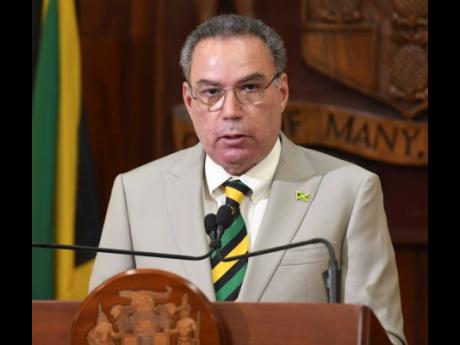Electric shock
Political clash erupts over 'last-minute' gov’t plan to revamp JPS agreement
The Jamaica Public Service (JPS) has expressed serious concern over the Government’s decision not to renew its all-island electricity licence under the current terms, warning of major implications for the island’s energy sector.
Energy Minister Daryl Vaz announced the decision during a press conference at Jamaica House on Monday, saying the current licence agreement – signed in 2001 under the then People’s National Party (PNP) administration – has failed to serve Jamaicans well, contributing to some of the highest electricity prices in the region.
“My letter to the JPS was written pursuant to Condition 27 of the licence, which provides for the Government of Jamaica to acquire the licensed business at the expiration of the terms of the licence,” said Vaz. “Prior to the expiry of the current licence in 2027, we intend to negotiate new licensing terms and conditions with potential investors which are favourable to the people of Jamaica.”
“The people of Jamaica have not been served well by the existing electricity supply arrangements. The terms under the current licence have yielded electricity prices which are among the highest in the region,” he continued, affirming that the move, although made during the heights of political campaigning ahead of the upcoming general election, is not political.
He said that any new terms must reduce electricity costs and promote affordability.
JPS President and CEO Hugh Grant responded with concern, calling the development significant and stating that it presents “several implications” for the energy sector. He assured customers that JPS remains committed to providing “safe, reliable, resilient, and cost-effective electricity service.”
Grant added that the company’s leadership, shareholders, and legal team would assess the potential impact and consult with key stakeholders. Questions have already emerged about what this means for existing power purchase agreements with independent producers and whether the Government plans to separate power generation from delivery.
“This is uncharted territory ... . Right now, generation of electricity is done by several people. It’s not just JPS alone. So it would be interesting to know what will happen for those other players,” said a source close to the matter.
Opposition spokesman on energy and climate change, Phillip Paulwell, dismissed the announcement as “last-minute excuses”, criticising the Government’s handling of the energy portfolio.
Paulwell said he had warned the Government as early as 2023 to begin preparing for the licence’s expiration and had, in May, proposed reforms such as removing JPS’s right of first refusal, mandating competitive tenders for generation, and expanding rooftop solar incentives.
“After nine years in office, the Government is only now waking up to the reality that the high cost of electricity is strangling growth,” charged Paulwell. “For two years, I have urged the ministry to begin the process and make clear its intention about the JPS licence and the future of the energy industry in Jamaica. Meanwhile, the Government has abandoned the Energy Council, which was designed to help shape policy in the energy industry. Instead, they now rush to outsource advice from international experts instead of consulting with local stakeholders.”

